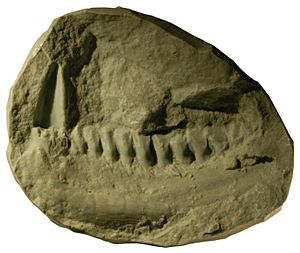Lycorhinus facts for kids
Quick facts for kids Lycorhinus |
|
|---|---|
 |
|
| Cast of holotype UCRC PVC10 | |
| Scientific classification |
|
| Kingdom: | Animalia |
| Phylum: | Chordata |
| Clade: | Dinosauria |
| Order: | †Ornithischia |
| Family: | †Heterodontosauridae |
| Subfamily: | †Heterodontosaurinae |
| Genus: | †Lycorhinus Haughton, 1924 |
| Type species | |
| †Lycorhinus angustidens Haughton, 1924
|
|
| Synonyms | |
|
|
Lycorhinus is a fascinating genus of dinosaur that lived a long, long time ago. It was an omnivorous dinosaur, meaning it ate both plants and possibly small animals. This dinosaur belongs to a special group called heterodontosaurids.
Contents
Meet Lycorhinus: A Small, Smart Dinosaur
Lycorhinus means "wolf snout," which is a cool name! This dinosaur was quite small, only about 1.2 meters (4 feet) long. That's about the size of a large dog. It lived during the Early Jurassic period, around 197 million years ago.
Where Did Lycorhinus Live?
Fossils of Lycorhinus have been found in South Africa. This tells us that millions of years ago, South Africa was home to many different kinds of dinosaurs. The area where its fossils were found is known as the Stormberg Group rock formation.
What Made Lycorhinus Special? Its Teeth!
The most interesting thing about Lycorhinus is its teeth. Like all heterodontosaurids, it had different kinds of teeth in its mouth.
- It had sharp, pointed teeth at the front, like fangs. These might have been used for defense or for grabbing food.
- Further back, it had flatter, leaf-shaped teeth. These were perfect for grinding up plants.
This mix of teeth is why scientists think Lycorhinus was an omnivore. It could handle both tough plants and perhaps small insects or lizards.
Discovery of Lycorhinus
Lycorhinus was first discovered and named by a scientist named Sidney H. Haughton in 1924. The first fossil found was a part of its jaw with some teeth. This discovery helped scientists learn more about the early dinosaurs and how they lived.
Why is Lycorhinus Important?
Lycorhinus is important because it helps us understand the early evolution of dinosaurs. Heterodontosaurids like Lycorhinus show us how diverse dinosaurs were even in their early stages. Their unique teeth give us clues about their diet and how they fit into the ancient ecosystem.
Images for kids
See also
 In Spanish: Lycorhinus angustidens para niños
In Spanish: Lycorhinus angustidens para niños
 | May Edward Chinn |
 | Rebecca Cole |
 | Alexa Canady |
 | Dorothy Lavinia Brown |



